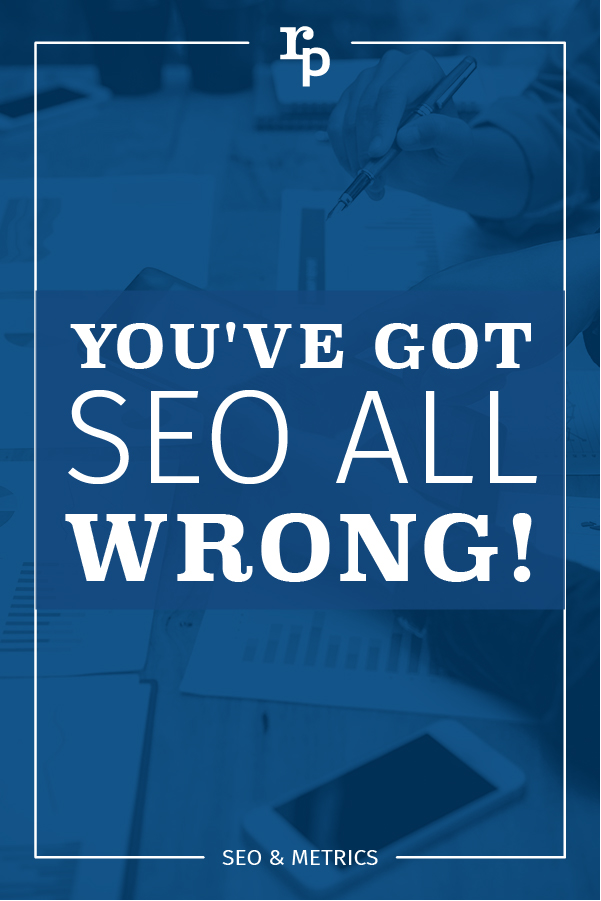3 Common, Yet Unrealistic SEO Expectations

This blog post was updated by Sam Von Tobel on 7/7/2020
Search engine optimization (SEO) can drive business owners nuts. The Internet is a tough nut to crack in terms of visibility, and SEO is one of the best ways to help yourself and your business be seen.
For that reason, many businesses undergoing a web redesign or building their first website, make SEO a top priority. But, the truth is, SEO is one of the single most misunderstood elements of a website. And, of course, with misunderstanding comes a certain set of expectations – many of which are totally unrealistic.
When we do a web design, we also try to give our clients a good understanding of SEO and efficient strategies on how to approach it going forward whether they continue to work with us or not. But, we still often have to temper the expectations of our clients.
SEO isn’t some impossible riddle, nor is it the answer to all your problems. Here are some of the most common and unrealistic expectations that accompany SEO.
“I’ve optimized for this keyword, so I should be at the top of Google searches.”
You did the research. You’ve written solid copy. You’ve targeted a popular keyword that best fits what you want people to search for when looking for your business. Good job! Unfortunately, you aren’t the only one.
It’s a common misconception that after completing SEO on your website you will immediately begin to rise in the ranks of Google search. But, it’s likely hundreds of businesses have also optimized for your specific keyword and are all fighting you for a spot on page one of Google.
The truth is, if you are fighting for a high ranking on an ultra popular keyword you are fighting an impossible battle. You will find much more success targeting less frequently used, niche keywords. Your ranking will likely be much more favorable and potential customers will stand a much better chance finding you this way. You can also devout your time and resources to Google AdWords to help supplement organic growth and exposure.
Finding your way to the top of page one is a lofty goal that takes lots of time and effort. You give yourself a much better chance of rising through the ranks if you commit to generating relevant and high-quality content and have the patience to let your website grow.
“I’ve done SEO on my website, so sales should significantly increase.”
With the misconception of SEO creating visibility also comes the assumption that visibility equals sales. More people are coming to your website, so that means they are going to buy from you, right?
Wrong.
All the visibility and all the traffic in the entire world doesn’t mean diddly squat if your landing pages suck. At the end of the day your website creates sales, not SEO. A potential customer hitting a landing page isn’t enough.
Your landing pages not only need to be attractive, the content needs to be fresh and engaging and needs to drive action, whether it’s tempting them with more information with a click of a button, a free demo or providing them with something of value like a whitepaper or download. If increasing sales is truly your goal, your focus shouldn’t be on SEO. Rather, it should be perfecting areas of inbound marketing – emails, blogs, social media.
“I did SEO when my website launched, so it’s been taken care of.”
So you went through your entire website, page by page, and did all the SEO work before you launched your website. That’s fantastic! But, you didn’t really think you were done, did you? Contrary to what you may think, SEO is never “done.”
SEO algorithms are pretty intricate and sometimes hard to get a grasp on. One thing that is certain, however, is that search engines definitely give preference to new, high-quality content. Constantly adding to your website, adding more content with the keyword or keywords you prioritize is the most consistent way to keep you ahead of the SEO game.
That’s just one of the many reasons we emphasize the importance of blogging.
It’s not just new content you have to concern yourself with either. Take the time to reevaluate old pages, posts and content. The rules may have changed since they were first put together and they could potentially benefit from a little bit of reworking.
This important process of reevaluating your old content is called “Re optimization” and it is one of the best things you can do to continually improve the content on your site and its overall SEO. As the Google algorithm changes, what used to be solid pages may now be lacking or as your site has aged some pages may have broken or slowed down without you knowing. Going through your site, checking pages, and updating content on a regular basis can really help give your site a boost.
One of the easiest ways to identify which pages you should focus your Re Optimization efforts is using a tool like Google Search Console or Ubersuggest. These free tools can crawl your website and evaluate the content on your site, identifying what pages need improving, what needs improving, and how you can improve it. Google rarely shares the specifics of their algorithm changes, so having a tool straight from Google offering advice is pretty nice.
If you’ve ever had a high ranking page or post in the past that you’ve noticed beginning to fall, that could be the reason. Go back, reevaluate, rewrite or add to your old posts to give Google a heads up that you are actually paying attention to your copy and may inspire it to give it a little extra help.
Mastering SEO isn’t impossible. You just need a little bit of help along the way.
got a project?
Whether you need a new website or some help with your social media we are ready to start the conversation.

Chatbot Basics 101
Let's talk about chatbots. You know, those things you sometimes message on different applications...
Favorite Social Media
What is your favorite social media platform? Remember the days when there was just Myspace? Oh,...
Call to Action Do’s and Don’ts
There is such a thing as a bad call to action The goal of any page on a website, whether it's the...
